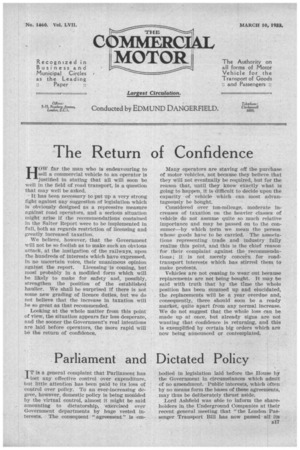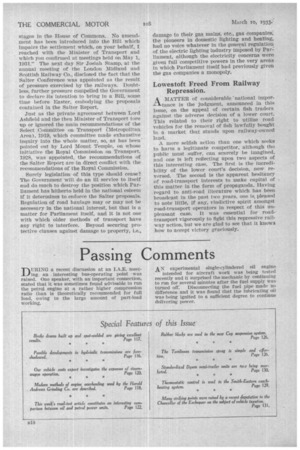Parliament and Dictated Policy
Page 35

Page 36

If you've noticed an error in this article please click here to report it so we can fix it.
TT is a general complaint that Parliament has -I-lost any effective control over expenditure, but little_ attention has been paid to its loss of control over policy. To an ever-increasing degree, however, domestic policy is being moulded by the virtual control, almost it might be said amounting to dictatorship, -exercised ovp: Government departments by huge vested interests. The consequent "agreement" is -em bodied in legislation laid before the House by the Government in circumstances which admit of no amendment. Public interests, which often by no means form the bases of these agreements, may thus be deliberately thrust aside.
Lord Ashfield was able to inform the shareholders in the Underground Companies at their recent general meeting that "the London Passenger Transport Bill has now passed all its sta,ges in the House of Commons. No amendment has been introduced into the Bill which impairs the settlement which, on your behalf, I reached with the Minister of Transport and which you confirmed at meetings held on May 1, 1931." The next day Sir Josiah Stamp, at the annual meeting of the London Midland and Scottish Railway Co., disclosed the fact that the Salter Conference was appointed as the result of pressure exercised by the railways. Doubtless, further pressure compelled the Government to declare its intention to bring in a Bill, some time before Easter, embodying the proposals contained in the Salter Report.
Just as the private agreement between Lord Aslifield and the then Minister of Transport tore up or ignored the main recommendations of the Select Committee on Transport TMetropolitan Area), 1919, which committee made exhaustive inquiry into the whole matter, so, as has been pointed out by Lord Mount Temple, on whose initiative the Royal Commission on Transport, 1928, was appointed, the recommendations of the Salter Report are In direct conflict with the recommendations of the Royal Commission.
Surely legislation of this type should cease? The Government will do an ill service to itself and do much to destroy the position which Parliament has hitherto held in the national esteem if it determines to enforce the Salter proposals. Regulation of road haulage may or may not be necessary in the national interest, but that is a matter for Parliament itself, and it is not one with which older Methods of transport have any right to Interfere. Beyond securing protective clauses against damage to property, i.e., damage to their gas mains, etc., gas companies, the pioneers in domestic lighting and heating, had no voice whatever in the general regulation of the electric lighting industry imposed by Parliament, although the electricity concerns were given full competitive powers in the very areas in which Parliament itself had previously given the gas companies a monopoly.
Lowestoft Freed From Railway Repression.
AMATTER of considerable 'national importance is the judgment, announced in this issue, on the appeal of certain fish traders against the adverse decision of a lower court. This related to their right to utilize road vehicles for the removal of fish lawfully bought in a market that stands upon railway-owned land.
A more selfish action than one which seeks to harm a legitimate competitor, although the public must suffer, can scarcely be imagined, and one is left reflecting upon two aspects of this interesting case. The first Is the incredibility of the lower court's decision, now reversed. The second is the apparent hesitancy of road-transport interests to make capital of . this matter in the form of propaganda. Having .regard to. anti-road literature which has been broadcast in the past two years, one is pleased to note little, if any, vindictive spirit amongst road-transport operators in respect of this unpleasant case. It was essential for roadtransport vigorously to fight this repressive railway action, but we are glad to see that it knows how to accept victory graciously.






































































































